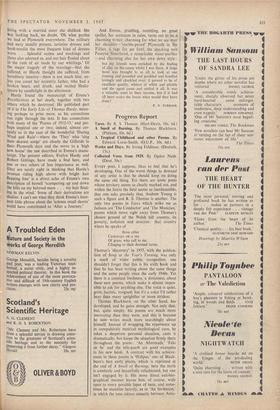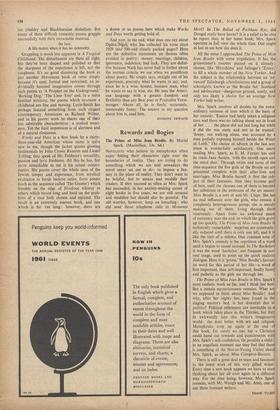Progress Report
A Tropical Childhood and other Poems. By 15s.) Collected Verse from 1929. By Ogden Nash. (.Dent, 30s.)
EVERY poet, I suppose, likes to feel that he's developing. One of the worst things to demand of any artist is that he should keep on, doing the same old thing. Yet there are some poets whose territory seems so clearly marked out, and within the limits the field seems so inexhaustible, that one asks precisely that. Andrew Young is such a figure and R. S. Thomas is another. The only two poems in Tares which strike me as failures are 'The Conductor' and `The Musician,' poems which move right away from Thomas's chosen ground of the Welsh hill country, its poverty, isolation and stoicism : that country where he speaks of
those other
Castaways on a sea
Of grass, who call to me, Clinging to their doomed farms.
Thomas's 'discovery' in 1955, with the publica- tion of Song at the Year's Turning, was only a mark of wider public recognition; one shouldn't forget that this is his sixth book and that he has been writing about the same things and the same people since the early 1940s. Yet there is a constant freshness, a directness, about these new poems, which make it almost impos- sible to ask for anything else. The voice is quiet, grim, laconic, resigned; but it's a voice I'd rather hear than many sprightlier or more strident.
Thomas Blackburn, on the other hand, has developed, and he gains strength. Not only that, but, quite simply, his poems are much more interesting than they were; and this is because he now writes much more searchingly about himself. Instead of wrapping the experience up in compulsively metrical mythological yarn, he takes a desperate personal situation, casts it dramatically, but keeps the situation firmly there throughout the poem: 'An Aftermath,'"Feb° de Se' and the title-poem are good examples in his new book. A contrast with' his achieve- ment in these poems is `CEdipus,' one of Black- burn's best early pieces, which is reprinted at the end of A Smell of Burning; here the myth is sombrely and beautifully refashioned, but one isn't engaged by it. His more direct autobio- graphical manner leaves him, of course, wide open to every possible lapse of taste, and some- times he stumbles heavily, as in 'An Invitation,' in which the tone teeters uneasily between Amis- ian ribaldry and Blackburnian diabolism. But many of these difficult romantic poems grapple successfully with their intractable material.
the fuss A life makes when it has no symmetry.
Grappling is much less apparent in A Tropical Childhood. The disturbances are there all right, brit they've been shaped and polished so that the sharpness of the experience is left, not the roughness. It's no good dismissing the book as just another Movement book of verse simply because it's neat, formal and restrained; an in- dividually haunted imagination comes through such poems as 'A Prophet on the Underground,' 'Barking Dog,' `The Lime Tree' and, in a more familiar territory, the poems which re-create a childhood are fine and moving. Lucie-Smith has perhaps learned something from such elegant contemporary Americans as Richard Wilbur, and in his poorer work he shares one of their less admirable characteristics: a studied weari- ness. Yet the final impression is of alertness and of a natural eloquence.
Works and Days is a first book by a thirty- three-year-old American whose name is quite new to me, though the jacket quotes glowing testimonials by John Crowe Ransom and Lionel Trilling; they speak of Mr. Feldman's versatility, passion and lyric freshness. All this he has, but mere remarkable to me is his actual subject- matter. His poems cover the whole span of the Jewish, temper and experience, from mystical exultation to harsh incisive satire, from poems (such as the sequence called 'The Gnome') which tremble on the edge of frivolous whimsy to others which brood long and hard on the prob- lems of a race both chosen and rejected. The result is an extremely uneven book, and one which is far too long: however, there are a dozen or so poems here which make Works and Days worth getting hold of.
And now, in the end, what does one say about Ogden Nash, who has collected his verse since 1929 into 500-odd closely packed pages? Here are the definitive statements on themes often avoided in poetry: money, marriage, children, ignorance, indolence, bad luck. They are defini- tive because Nash has never had to bother about the normal criteria we use when we pontificate about poetry. He simply says, straight out of his experience, precisely what he wants to say; and, since he is a wise, honest, humane man, what he wants to say is wise, etc. He uses the Ameri- can language with a greater freedom and flexibility than any Beat poet or Projective Verse- monger. Above all, he is finely, accurately, memorably funny. The answer to my question about him is, read him.
ANTHONY THWAITE















































 Previous page
Previous page